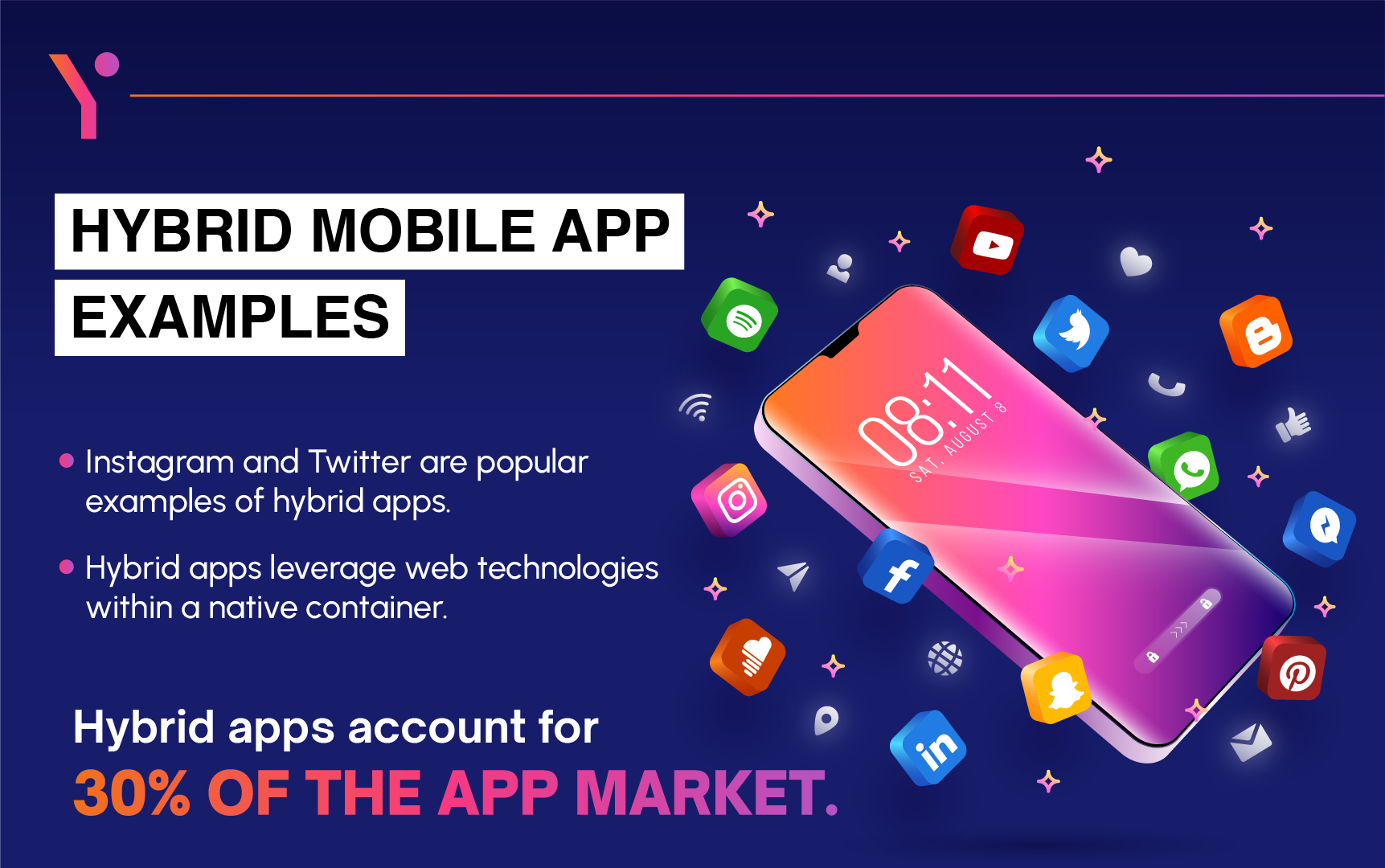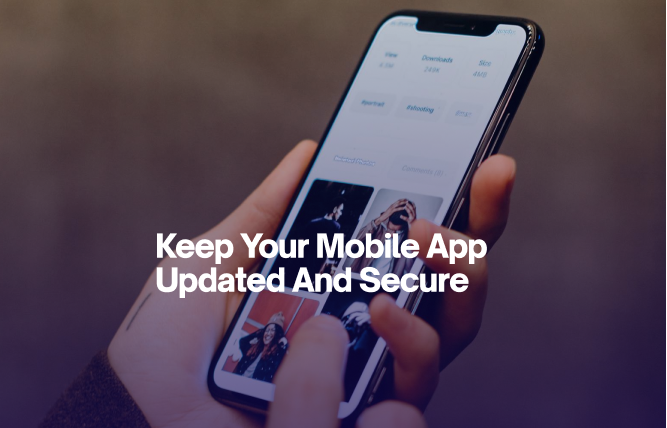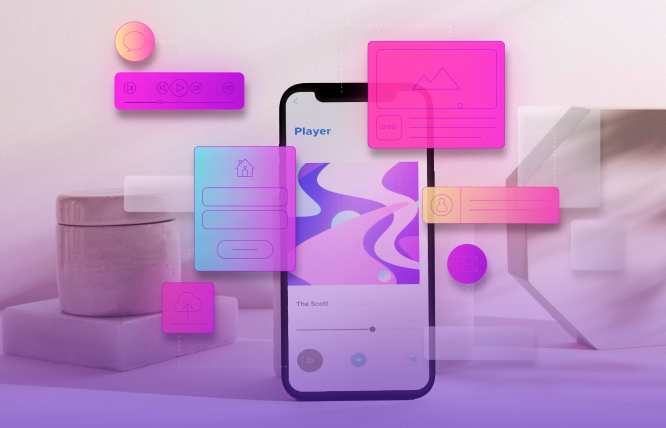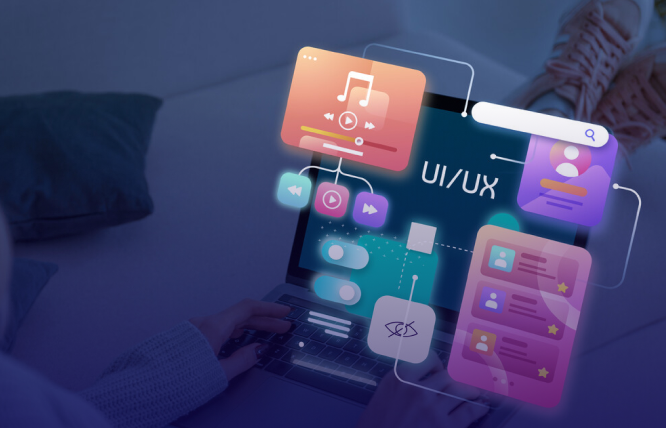This blog post explores hybrid mobile apps! We will break down the benefits (think: cost-effective, fast launch) with real-world examples (Uber, Instagram) and explain why FuturByte can be your perfect hybrid app development partner.
Were you aware that 72% of smartphone users depend on apps daily? If you’re planning to take your business live in front of a massive audience through an app, then a hybrid app can be your companion because the price of personalised Android and iOS applications can present a significant obstacle.
That’s where hybrid mobile apps come in! A hybrid app means you only need to build a single app that works flawlessly on both iPhones and Androids, reaching millions – just like Instagram!
In this blog, we will explore some successful hybrid mobile app examples, showcasing how hybrid apps save you time and money. We’ll also explain why FuturByte can be your partner in hybrid app development success.
No more dreaming; now is the time to start turning that vision into an app. Worried about the hefty costs of custom Android app development and custom iOS app development services? Or maybe you’ve been eyeing those Instagram app features and wondered how they built such a smooth experience? Well, fret no more! Hybrid mobile apps might be the answer you’ve been looking for.
What Makes Hybrid Apps Unique?
Hybrid mobile apps combine the features of native apps and web apps. They are constructed with a unified codebase (similar to building blocks) that functions smoothly on various operating systems such as Android and iOS.
The concept of Hybrid apps originated from developers wanting to simplify their processes and reduce time and cost – developing hybrid mobile apps is much more affordable than making individual native apps for each platform.
Moreover, Hybrid apps have the capability to utilise native device functions such as the camera and GPS on your phone, allowing you to develop apps with abundant features while maintaining full functionality.
Hybrid App vs Native Apps vs Progressive Web App
Now, you might be wondering how hybrid apps stack up against other options like native apps and progressive web apps (PWAs). Here’s a quick breakdown:
- Native Apps: These are the champions of performance and user experience, built specifically for each platform. But, as mentioned earlier, they come with a hefty price tag and require you to write separate code if you want to cater to both iOS and Android users.
- Progressive Web Apps (PWAs): PWAs are essentially websites that act like apps. They offer offline functionality and decent user experience but might lack some of the native features you crave.
- Hybrid Apps: These apps are perfect for anyone who has a broad vision and a comparatively lower budget. Hybrid apps can be your golden ticket! They offer a balance between affordability and features, making them a great choice for many businesses.
Pros and Cons of Hybrid Mobile Apps
| Pros | Cons |
| Cost-Effective Development | Performance Issues |
Using one codebase for various platforms helps in saving both time and money. | May not reach the same level of performance as native apps, especially when dealing with intricate animations and high-quality graphics. |
| Faster Time to Market | Limited User Experience |
Quick launch using frameworks like React Native or Flutter. | Might not provide the same level of user experience as native apps. |
| Easy Maintenance | Dependency on Third-Party Frameworks |
One codebase makes updates and bug fixes simpler and quicker. | Reliance on third-party frameworks can impact app stability and require constant monitoring. |
Successful Hybrid Mobile App Examples
Looking at hybrid mobile app examples can give you insights into how effective these apps can be. Here are some successful hybrid app implementations that showcase the potential of this approach.
Instagram combines different methods to provide a smooth user experience on various devices. This popular social media platform employs a single codebase to guarantee that updates and features are consistent across both iOS and Android users. Instagram’s smooth and integrated user experience has led to its widespread popularity as a global social media platform.
Top Features
- Photo and video sharing
- Direct messaging
- Stories and reels
- Explore the page with personalised recommendations.
- IGTV for longer videos
Uber
Uber, A giant rides sharing company, also utilises hybrid technology. The application handles live data updates and an easy-to-use interface, delivering dependable service to millions of users around the world. Uber’s use of hybrid mobile app development demonstrates how this approach can handle complex functionalities and deliver high performance.
Top Features
- Real-time ride tracking
- Multiple payment options
- Ride scheduling
- Fare estimation
- In-app support and help
Twitter Lite
Twitter Lite offers a fast and data-efficient experience, especially in regions with slow internet speeds. Using hybrid technology, Twitter Lite maintains high performance while minimising data usage. This app is a perfect example of how hybrid mobile apps can cater to a wide audience with varying needs.
Top Features
- Quick loading times
- Data saver mode
- Push notifications
- Offline support
- Simple user interface
Apple App Store
The Apple App Store is written in HTML5. It showcases the capacity of hybrid apps to deliver a high-quality user experience. The app features an easy-to-use interface with many outstanding functions, helping users find and download applications quickly.
Top Features
- Search function
- Real-time product updates
- Recommendations based on purchase history
- User reviews and ratings
- Easy navigation
My BMW App
The My BMW App is another top hybrid app example. It utilises Flutter, a multi-platform development framework. BMW moved to hybrid development in 2018 to unify its iOS and Android apps, ensuring a consistent user experience across all platforms.
Top Features
- Remote vehicle control
- Real-time vehicle status
- Navigation and map integration
- Service appointment scheduling
- Personalised user settings
eBay Motors
eBay Motors is a dedicated app for buying and selling cars, built as a hybrid app. Using Flutter, eBay shares 98.3% of its code across Android and iOS apps, offering a unified experience to all users.
Top Features
- Vehicle listings with detailed descriptions
- Search filters
- In-app messaging
- Secure payment options
- Vehicle history reports
Microsoft Teams
Microsoft Teams, built with React Native, supports cross-platform use, from phones to desktops. This hybrid application guarantees uniform performance on every device, simplifying the process for users to connect and work together from any location.
Top Features
- Video and audio calls
- Chat and messaging
- File sharing and collaboration
- Calendar integration
- Customisable team channels
Tesla App
Tesla owners appreciate the ease of the Tesla app, which links to their vehicles and enables remote management. This hybrid app allows for fast updates and patches using only one codebase, guaranteeing a seamless and effective user experience.
Top Features
- Remote climate control
- Car locator with flashing lights
- Charging status monitoring
- Software updates over the air
- Vehicle health diagnostics
These hybrid mobile app examples showcase the versatility and power of hybrid technology. Whether for social media, ride-sharing, or vehicle control, hybrid apps provide robust solutions that cater to diverse user needs.
What Are the Perks of Using Hybrid Mobile Apps
Hybrid mobile apps bring together the advantages of web apps’ speed and native apps’ performance. They are the option for companies seeking to target a broad audience without spending a lot of money. Let’s dive into the perks.
Cost-Effective Development
Creating hybrid mobile apps is cost-effective. You just need to utilise one codebase for iOS and Android, which eliminates the need for different development teams. This helps you save time and money, enabling you to distribute resources more effectively.
Faster Time to Market
It is crucial to quickly bring your app to market. Hybrid apps allow for quicker launches. React Native and Flutter frameworks accelerate the development process, enabling you to introduce your app to users earlier compared to native development.
Easy Maintenance
Maintaining hybrid apps is straightforward. One codebase means updates and bug fixes are easier and quicker. This simplicity keeps your app running smoothly without demanding too much effort from your team.
Cross-Platform Compatibility
Hybrid applications function smoothly across various platforms, providing a uniform user experience for customers using iOS or Android devices. This broad compatibility of hybrid apps makes it a win-win situation for businesses targeting diverse audiences.
Access to Device Features
Hybrid applications have the ability to access device functionalities such as the camera, GPS, and push notifications. This feature enables you to offer a high-quality user experience like native applications, which can improve user interaction and happiness.
Scalability
Hybrid apps are scalable. They can be scaled alongside your business, and your app can also evolve without needing a complete overhaul. This scalability makes hybrid apps a practical choice for long-term business strategies.
Who Builds the Perfect Hybrid Apps
We adapt to modern technologies faster than anyone else. Our developers make use of cutting-edge technologies to provide premium hybrid app solutions. They trust us to develop high-quality custom hybrid mobile apps. Here’s why we are the perfect partner for your hybrid app development:
Expertise and Experience
We bring not only the experience but also the creativity that’s needed to build a hybrid app. Our team has a good track record of successful hybrid app implementations, making us a trusted app development company.
Customised Solutions
Every business demands something unique. Therefore, we offer custom android app development and custom iOS app development services to all business having distinctive needs. Whether a simple app or a complex solution, we can help you build all types of app.
Cutting-Edge Technologies
We utilise the most recent technologies, such as React Native mobile app development service and Flutter mobile app development. These frameworks allow us to create strong, flexible, and high-performing hybrid applications that provide a smooth user experience on every platform.
Comprehensive Support
From the first meeting to the support after launching, we are there for you throughout the entire process. Our all-encompassing assistance guarantees that your application stays current and functions at its best, delivering a top-notch user experience.
Client-Centric Approach
Our main focus is on including all the features that you want. We collaborate and grasp your vision to turn it into a practical, user-friendly application. Our focus on the client ensures that the end result meets your objectives and goes beyond what you expect.
Seamless Integration
We design your hybrid applications to integrate with different platforms and services. If you are in need of AWS consulting company services or other integrations, we ensure smooth functionality and interoperability.
Conclusion
Hybrid mobile applications combine performance, cost-efficiency, and cross-platform compatibility effectively. They enable companies to quickly and efficiently expand their reach to a larger audience, while also ensuring a consistent user experience. The success of hybrid mobile app examples, ranging from popular names like Instagram and Uber to crucial tools like Microsoft Teams and Tesla’s app, is evident. These applications demonstrate the strong capabilities and adaptability that hybrid mobile app development offers.
So why wait to get a hybrid app live? Contact FuturByte. Our expertise lies in developing high-quality hybrid mobile applications that are customised to suit your specific business requirements. Our skills, along with advanced technologies such as React Native and Flutter, guarantee that your app will differentiate itself in the competitive market. We are always willing to provide top-notch solutions that improve your business operations and engagement with users.
We envision your ideas and collaborate with you to maximise the capabilities of hybrid app technology. Allow us to assist you in creating an app that not just meets but surpasses your expectations, pushing your business ahead in the rapidly evolving digital world.
Frequently Asked Questions
Yes, there are many successful hybrid mobile apps. Instagram, Uber, and Twitter Lite are some prime examples. These applications offer a unified experience on both iOS and Android platforms, showcasing the versatility and effectiveness of hybrid technology.
Common frameworks for hybrid app development include React Native and Flutter. React Native mobile app development service and Flutter mobile app development offer robust tools for building cross-platform mobile apps, ensuring high performance and a consistent user experience.
Yes, hybrid apps can offer performance comparable to native apps. With advancements in frameworks like React Native and Flutter, hybrid apps can achieve near-native performance. A skilled app development company can optimise hybrid apps to meet high-performance standards, making them a viable alternative to native apps.
Hybrid mobile app examples can be applications that integrate features from both native and web applications. It is built utilising web technologies such as HTML, CSS, and JavaScript, and enclosed within a native container. Instagram is an illustration of a hybrid app that employs one codebase to ensure a uniform experience on both iOS and Android platforms.
Hybrid apps are created by utilizing web technologies and encasing them in a native shell. This enables them to operate on various platforms using just one set of code. For example, Uber uses hybrid mobile app development to manage real-time data updates and provide a user-friendly interface. Another example is Twitter Lite, which offers a fast and data-efficient experience, especially in regions with slow internet speeds.
Have questions or feedback?
Get in touch with us and we‘l get back to you and help as soon as we can!





